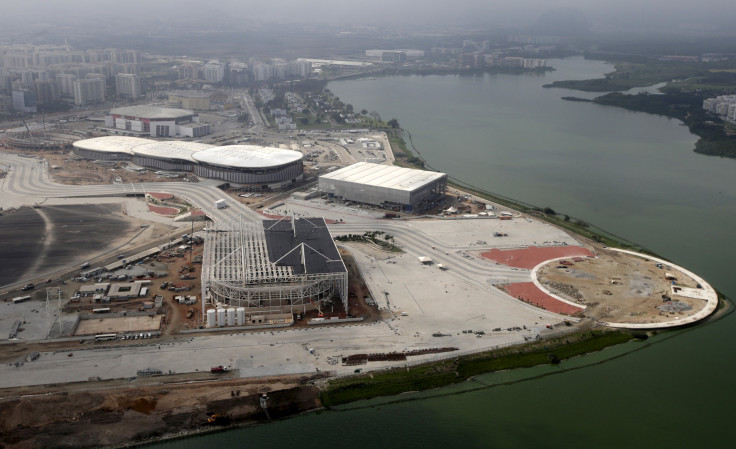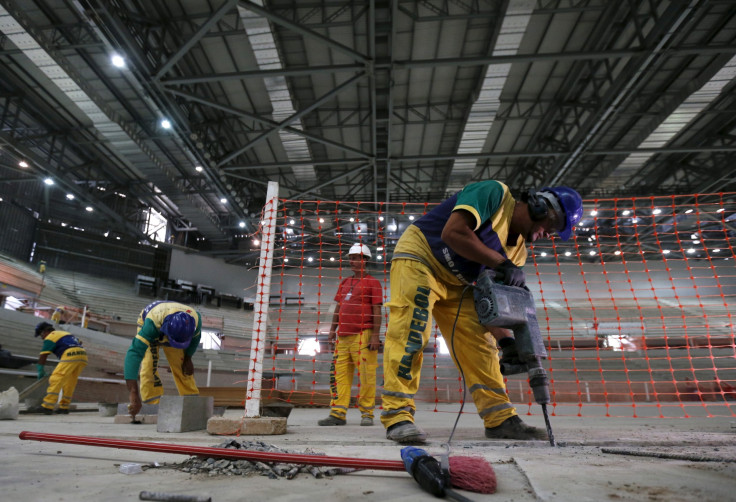Permanent Olympic Site Would Address Growing Costs, Host Issues, Advocates Say

For nearly 1,200 years, top athletes gathered on a Greek island for the sake of pure competition in the Olympic Games, without media-rights deals or massive construction projects to overshadow their efforts. In the modern day, a growing number of activists suggest a return to historic roots might be just what the international mega-event needs.
The creation of a permanent Olympic venue is just one proposed fix as more and more international cities balk at the exorbitant costs associated with hosting the Summer and Winter Olympic Games. Advocates say a reusable site would end the cycle of budget overruns in overmatched host cities and free the International Olympic Committee from having to consider questionable bids from autocratic regimes.
Russia spent an unprecedented $40 billion on the 2014 Winter Olympics in Sochi, an event marred by allegations of human rights violations related to the country's anti-LGBT "Propaganda Law" and exploitation of migrant workers. More recently, projected costs for the 2016 games in Rio de Janeiro ballooned from $2 billion to more than $13 billion amid construction delays, forced evictions and failed attempts to address water pollution. Host cities often wreck their economies to build infrastructure that falls out of use shortly after the games end. For critics, a permanent Olympic site is an attainable fix for a system that has rapidly become untenable.
“You would get rid of the whole issue, just the fiscal insanity, of building these huge edifices that you have a problem with dealing with afterwards,” said John Rennie Short, a professor of public policy and an urban development expert at the University of Maryland, Baltimore County.
Driven by a desire for global exposure and legitimacy, international governments have long downplayed the cost of hosting the games while trumpeting economic benefits, such as expanded local infrastructure. But cost overruns have plagued the Olympics for years. The International Olympic Committee demands that host cities commit to the construction of top-notch facilities while still adhering to environmental standards, and the desire to outdo previous host cities has led to increasingly extravagant projects. Host nations also commit millions to event security.
Budgetary Disasters
Several hosting bids have ended in financial disaster. The 1976 Winter Olympics in Montreal devastated the city’s economy, primarily due to massive cost overruns associated with venue construction. The Canadian city spent the next three decades paying back about $1.5 billion in debt directly related to the Olympics.
More recently, Greece spent between $10 billion and $15 billion to host the 2004 Summer Olympics in Athens, more than double initial estimates. The massive overages added to the country’s national debt and hastened its economic downturn, which by 2015 left Athens in danger of crashing out of the euro. The Olympic facilities Greece built to house thousands of athletes and spectators for two weeks have largely become obsolete relics. In all, Olympic host cities typically surpass their original budget by about 180 percent, the Economist reported.
“Most people recognize that there is a degree of extravagance that is simply not real in the Olympics, not just in the funding and the degree of organization, but also the number of sports that are being played. It’s just becoming ridiculous,” said Roger Howard, a freelance journalist, author and international relations expert in the United Kingdom who supports the creation of a permanent Olympic venue.
More than a year before the scheduled start of the 2016 Summer Olympics in Rio, Brazil has already begun to experience a financial pitfall. As of May, officials had completed just 10 percent of construction required at Olympic sites, and at times has relied on forced evictions to remove residents from sites. At the same point before the 2012 Summer Olympics, London had completed about 80 percent of the necessary construction, Reuters reported.

The IOC requires host cities to commit to certain environmental standards before and during the Olympics. Despite vast spending, Rio has fallen far short of those standards. A recent investigation found waterways that were to be used for 2016 Olympic events were full of dangerous bacteria and viruses.
In the face of so much evidence, cities have begun to rethink the merits of hosting the Olympics. Earlier this month, Boston withdrew its bid to host the 2024 Summer Olympics, citing concerns about cost and a lack of local support. Similarly, the IOC chose from an abnormally small pool of candidates for the 2022 Winter Olympics after several European cities, including Oslo, Norway, and Krakow, Poland, withdrew their candidacy.
Facing a dearth of bids from developed cities in the West, the IOC is increasingly turning to autocratic regimes like those of China or Russia – nations that were willing to accept massive Olympic budgets in order to display their power on an international stage. Beijing was awarded hosting rights for the 2022 Winter Olympics last month, despite a questionable human rights record that included forced evictions, mass detention of protestors and various labor violations.
Even as host cities fall into debt, the IOC, based in Switzerland and considered a not-for-profit organization, has enjoyed unprecedented revenue. The organization earned a record $8 billion in revenue from 2008 to 2012, due in large part to skyrocketing media-rights deals, Sportscal reported.
“That’s why you have the bidding system -- it’s in the IOC’s benefit, because they share the profits but don’t bear the costs. When you look at it objectively, the system’s geared up to generate funds for the IOC. Where do these funds go, exactly? The best you can say about the IOC is that it’s slightly better than FIFA,” Short said.
A Viable Alternative?
The creators of the modern Olympics chose the rotating host system to promote the event’s commitment of global community and inclusiveness, but the idea of a permanent host site has floated for decades. When the United States chose to boycott the 1980 Olympics in Moscow amid Russia’s invasion of Afghanistan, the U.S. Senate’s Foreign Relations Committee urged a discussion on the merits of “the creation of permanent homes for Summer and Winter Olympic Games, including one in Greece, the country of their origin.”
There are several theories on how best to implement a permanent venue, but experts agree the chosen site would have to be relatively secure and politically stable. Short advocates the creation of a permanent Summer Olympics site on a Greek island, possibly Olympia, which historically played host to the event. Under his model, the IOC could use its existing coffers and sell bonds against future media deals to raise the money necessary to build infrastructure. Olympic arenas would be reused every four years, with the site serving as a site for other international events in-between. The Greek government would welcome foreign investment as it battles its ongoing debt crisis, he said.
“The funding is not the issue. The issue is where it will go and what would be the organization,” Short said.
The IOC could also grant a willing country long-term control over a permanent Olympic site and then allow that country to sell hosting rights every four years to “sponsor” nations, Howard said. While it would be difficult to secure funding for the project or to agree on the site’s location, the project could allow the international community to invest in fledgling nations in need of financial support.
“There is a really big opportunity here for the West and the outside world, Britain, America and other countries, to provide some sort of not just security, but investment in developing countries that desperately need that,” Howard said.

The Future of the Olympics
While cries for widespread reform of the current Olympic model are intensifying, most people associated with the process have expressed skepticism about the probability of a permanent site. The project would require an unprecedented level of international collaboration, in terms of both construction and raising the necessary funds. Negotiations on where to place the venue would be contentious.
Moreover, the Olympic bidding process is far too lucrative for the IOC. As long as countries are willing to spend billions of dollars to host the event, media-rights deals will continue to grow in value and the IOC will continue to make money.
“If they end up with few or no bidders, suddenly there’s an incentive,” said Barry Sanders, longtime chairman of the Southern California Committee for the Olympic Games. “But I don’t think they’re anywhere near that for the Summer Olympic Games. And the Winter Games, if they get removed from the $60 billion or $70 billion Sochi extravaganza, I think the reluctance [to host] will fade.”
© Copyright IBTimes 2024. All rights reserved.












